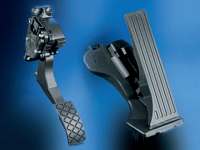Sensors for detecting the driver's intentions and checking the system status are essential components of today's mechatronic systems in vehicles. Position sensors are particularly important in all moving systems.
 Contactless sensor solutions are increasingly being used to improve the reliability and availability of mechatronic systems. An inductive measurement principle has proven to be particularly suitable for this purpose.
Contactless sensor solutions are increasingly being used to improve the reliability and availability of mechatronic systems. An inductive measurement principle has proven to be particularly suitable for this purpose.
This technology can be used to determine the current positions of drive pedals, throttle valves, level control systems, and turbochargers, even under unfavorable environmental conditions.
The position sensors have several signal outputs that are used depending on the measurement task or vehicle manufacturer. Analog (ratio-metric, voltage, current) or digital (PWM) signals and CAN bus interfaces are used. In all cases, the synchronization of the signals on all interfaces is a decisive quality criterion in production and development.
In the test environment, ADwin controls a stepper motor for position specification and simultaneously records both the reference position of an incremental encoder and the signal of the position sensor. motor for position specification and simultaneously records both the reference position of an incremental encoder and the signal outputs of the tested sensor. ADwin evaluates, for example, the temporal relationship between the arrival of a CAN message, an analog signal output, and the reference position, and immediately decides whether the target values are being maintained. The results are made available to the PC for evaluation and logging.
The deterministic operating principle with response times as short as 300 ns ensures that no information is lost when testing X-by-wire components. Thanks to easy programmability in ADbasic, customers always have a precise insight into their tested components with ADwin.